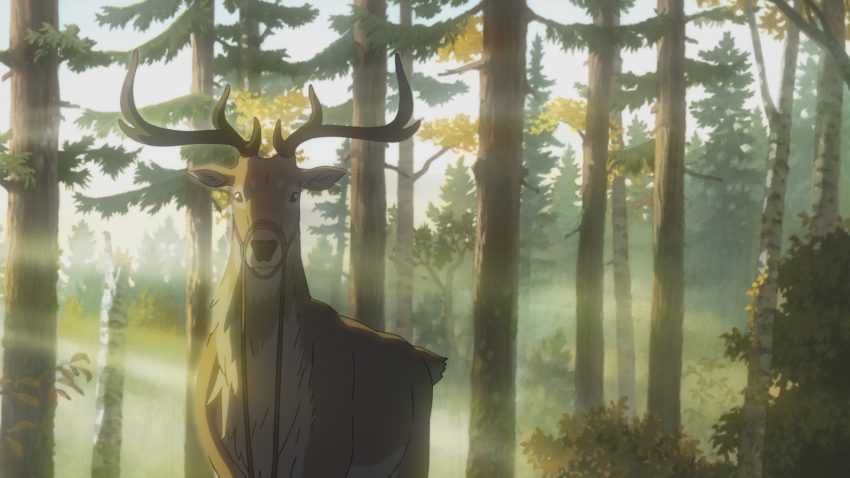Books: The Deer King
October 15, 2021 · 0 comments
By Motoko Tamamuro.

A salt mine controlled by the Empire of Zol is attacked by a pack of dogs. The workers and slaves are all bitten, and within days, everyone falls ill. Van, a former leader of a fearsome militant group and now a slave finds himself being the sole survivor there, bar an infant girl Yuna. With Yuna, he escapes from the mine.
Ever since the dog attack, Van seems to have acquired an acute sense of smell and hearing. The world is depicted through his senses freshly and vividly. The softness of a snowflake landing on a moss, the waft of leaves on the trees and dump ground in the forest, the aroma and the taste of simple boar stew…
A few days after the salt mine incident, Hohsalle the medical doctor comes to examine the aftermath and realises that it could be the same deadly disease that killed off his mother country centuries earlier. He decides to find Van in search of the cure of the disease – Black Wolf Fever. In the meantime, a mysterious disease that is said to only “kill immigrants” is spreading through the country…
As-yet unavailable in English, Nahoko Uehashi’s novel The Deer King, which inspired the anime of the same name, was published in September 2014. The author was a Hans Christian Andersen Award winner and the creator of Moribito: Guardian of the Spirit, which won the Mildred L. Batchelder Award in 2009. The Deer King has also won the Japan Booksellers’ Award and the fourth Japan Medical Novel Award in 2015.
The story revolves around an unknown viral disease and a quest to find a cure for it, inspired by the author’s reading of Virolution by Frank Ryan. That, of course, mirrors our current situation with COVID-19, although it was published well before the illness has paralysed our world. “There is no one in this world who is completely free from illness,” says Hohsalle. Disease do not discriminate. The fear felt among people and scientists’ earnest search for cure are all too familiar to us all now.

Uehashi was fascinated by the analogies to be found between our external world and the cells at work inside our bodies, each with their own form of antagonism and mutually possible coexistence. The world she delineates, somewhat reminiscent of The Lord of the Rings, is as intricate as our own, featuring a kingdom, Aquafa, subjugated and overrun by the conquering Empire of Zol. Policies designed to quell potential rebellion have caused great suffering among local tribes, even forcing some to abandon their native land and move to another part of the country. Characters from different backgrounds and social classes have differing agendas – from the humblest reindeer herder on the borderlands, to the Emperor on his throne, backgrounds histories and social position are interwoven with the main plot. But Uehashi does not merely focus on revolutionary struggles – she is also interested in how people muddle through, preserving their own culture and adapting to a new environment, even how people from differing cultures can respect one another and live together in peace.
Uehashi’s novel also has a strong sense of environmental issues, with Zol imperial policies driving out the sustainable existence of native farmers, and transplanting damaging cattle-rearing schemes that are destroying the pre-existing habitats. Against this backdrop of failing lives, she contrasts Van, the bereaved former family man who joined the military to forget, only to see his comrades die in battle. But by surviving the disease, he finds a new hope in the form of Yuna, a veritable bundle of job who drags him up from the pit of despair and brings sunshine into his life.
The Deer King is like a crepe cake. Seemingly simple but filling. There is rich cream underneath each layer, each with slightly different flavour but they are marry together wonderfully. The writing is lean and the robust worldview is told in a casual, almost throwaway fashion in conversation between characters or in their thoughts.
What set this story apart from many other fantasy novels is what is behind the main events – the characters’ culture, lives, beliefs, and thoughts behind their actions. “I wrote an ethnography set in a fantastical world,” explains Uehashi in her notes. “I set in a fantastical world because I believe it is important for the readers to step outside of various stereotypes in the real world.” This is a novel that deserves repeated reading and it will definitely sit on my bookshelf for a long time.
The Deer King novel is currently available only in Japanese. The Deer King anime is screening this weekend at Scotland Loves Anime, followed by a recorded Q&A with director Masashi Ando.
Leave a Reply